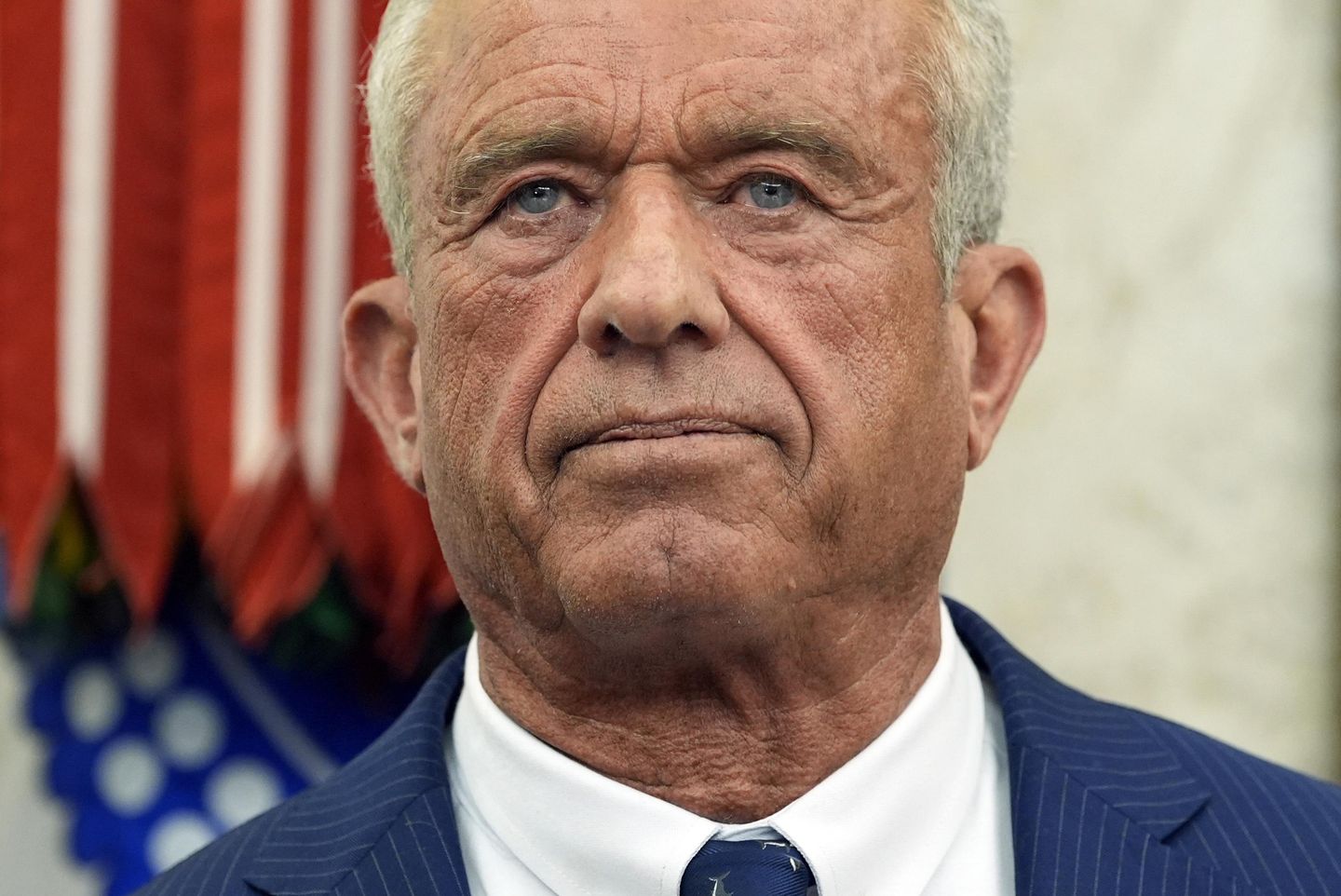
A major fast-food chain switched its cooking oil and state Republicans are cracking down on dyes and processed foods in school lunches, chalking up early wins for Health and Human Services Secretary Robert F. Kennedy Jr. and his drive to “Make America Healthy Again.”
Mr. Kennedy is pushing to make more sweeping changes to the food-and-drug landscape, from forcing companies to prove their ingredients are safe to telling the “Big Food” sector he won’t accept harmful additives that aren’t allowed in places like Europe.
“There’s a new sheriff in town,” he said after a recent meeting with food executives. “President Trump wants something that is going to happen not in 10 years, not in four years, not even in three years, but he wants it to happen right now.”
Yet some policymakers and businesses are switching gears voluntarily, hoping to latch onto the MAHA movement in its nascent stage.
West Virginia Gov. Patrick Morrisey name-checked President Trump and Mr. Kennedy in signing a bill this week that would ban certain seven food dyes, including Red Dye No. 3 and Red Dye No. 40, from school lunches starting in August.
The bill also prohibits the sale of food items or drugs that contain those dyes and two preservatives, butylated hydroxyanisole and propylparaben, starting on Jan. 1, 2028.
The governor said the law would protect children from long-term health and learning challenges.
“West Virginia ranks at the bottom of many public health metrics, which is why there’s no better place to lead the Make America Healthy Again mission,” Mr. Morrisey said. “Thank you to the legislature, HHS Secretary Robert Kennedy, and the entire Trump administration for helping us launch this movement right here in West Virginia.”
Days earlier, Virginia Gov. Glenn Youngkin signed a bill that prohibits public elementary and secondary schools from serving any food that contains specific color additives.
Mr. Trump tapped Mr. Kennedy as health secretary after the Democratic scion dropped his presidential bid and rallied behind the Republican nominee, saying they agreed on the need to Make America Healthy Again, a riff on the president’s trademark Make America Great Again slogan.
Health experts and lawmakers are concerned about some of Mr. Kennedy’s history of vaccine skepticism, particularly while a measles outbreak rages in Western states.
Yet his focus on food additives and positive health choices, generally, is popular and has attracted an unlikely coalition of conservatives and so-called crunchy-granola moms who are typically liberal.
The most tangible sign of the Kennedy effect came when Steak n’ Shake, an Indianapolis-based fast food chain, announced it would follow the secretary’s advice and transition from using seed oils to fry its onion rings, fries and chicken tenders to beef tallow, saying the switch would ensure their food does not have additives, preservatives or chemicals.
“Steak ’n Shake is proud to support MAHA and Secretary Kennedy! Your days are numbered seed oil. We want to lead the way and make a difference!” the fast-food company said on X.
Sweetgreen, known for its salad options, announced a seed oil-free menu in January, though it did not mention Mr. Kennedy or the MAHA movement by name.
“Our country is having a long-overdue conversation about food. And it’s about time. From ultra-processed ingredients to artificial additives, there’s a lot on our plates that isn’t doing us any favors,” tweeted Jonathan Neman, co-founder and CEO of Sweetgreen.
He said the switch began last year, removing seed oils in favor of extra virgin olive oil and avocado oil for roasting vegetables and proteins.
Mr. Kennedy and his allies say seed oils are harmful, citing in part the chemicals used in processing the oils and potential inflammatory responses in the body due to an imbalance from high omega-6 and low omega-3 content.
Scientists contend the inflammation is not acute because the chemical used, hexane, is evaporated off and not in harmful amounts.
Others say unsaturated fats in seed oils — canola oil, grapeseed oil, etc. — can be better for your LDL cholesterol than saturated fats like lard or beef tallow, and the main culprit is the unhealthy junk foods that contain certain oils, versus the oils themselves.
“It’s true that we eat more ultra-processed junk food than we ever have before,” Christopher Gardner, the director of nutrition studies at the Stanford Prevention Research Center, said in a blog post on the topic. “But the evidence is clear that the harms of this kind of food have more to do with their calories and their high amounts of added sugar, sodium, and saturated fat than with seed oil.”
Yet public polling explains why Mr. Kennedy’s focus on food additives or chemicals is gaining traction.
A recent KFF poll found majorities of Republicans (61%), independents (56%) and Democrats (55%) believe putting stricter limits on chemicals in the food supply should be a “top priority” for Congress or the Trump administration.
The concept is far more popular than other ideas associated with Mr. Kennedy, such as recommending that communities no longer add fluoride to drinking water. Only a quarter of Republicans said that it should be a priority, and even lower shares of Democrats and independents think it is important.
Not everyone is happy with Mr. Kennedy’s approach, however, saying it will lead to government overreach.
Jeffrey Singer, a practicing surgeon and senior fellow at the libertarian Cato Institute, said businesses have responded to consumer demand by offering additive-free options.
“You go into a regular supermarket and there’s a section with foods like that,” he said. “I have no problem with that. I have a problem when states ban stuff like they did in West Virginia. Let people make their own decisions.”
The crackdown on food additives and dyes is spreading across the country. The Arizona House of Representatives passed a bill in February that would ban “ultra-processed foods containing harmful additives” from being served in public schools. A press release on the bill said it would “Make School Lunches Healthy Again.”
“Our kids deserve better than artificial dyes and cheap fillers in their meals,” State Representative Leo Biasiucci, a Republican and chief sponsor, said. “Parents should know that when their children eat at school, they are getting real, nutritious food — not the kind of processed junk that’s banned in other countries. This is common sense, and I’m proud that my colleagues came together to pass this important bill.”
Vani Hari, a Kennedy ally who champions whole foods in place of processed foods on her website, FoodBabe.com, said her Indian immigrant parents urged their children to eat like Americans. But that led to fast food and health problems.
She decided to eliminate processed foods and chemicals from her diet.
“When I made that change, everything shifted in my life. I lost weight, never gained it back,” she said in a phone interview.
Ms. Hari, 46, of North Carolina, entered Mr. Kennedy’s sphere when she spoke at a Senate roundtable on health in September.
She lobbies for changes to the American food industry in line with the MAHA movement, pointing to disparities in what the U.S. allows in its food versus other countries.
“Over and over again, as I talk to these state legislators, they tell me, ‘I would have never thought to do this.’ I have heard that more than once,” she said. “It drives awareness to the public as well, the public starts making better choices.”
Mr. Kennedy is trying to make big changes on his own at the federal level.
The Food and Drug Administration is testing approximately 340 samples of infant formulas — including powder, concentrate, and ready-to-drink versions — for contaminants such as arsenic, cadmium, lead and mercury, according to HHS.
Further, Mr. Kennedy directed the FDA to revise a standard, known as the Generally Recognized as Safe (GRAS) exemption, that allows some food ingredients to avoid testing as opposed to the European system that requires companies to prove their substances are safe.
“For far too long, ingredient manufacturers and sponsors have exploited a loophole that has allowed new ingredients and chemicals, often with unknown safety data, to be introduced into the U.S. food supply without notification to the FDA or the public,” Mr. Kennedy said in a video explaining the move. “Eliminating this loophole will provide transparency to consumers, help get our nation’s food supply back on track by ensuring that ingredients being introduced into foods are safe, and ultimately Make America Healthy Again.”
The Consumer Brands Association, a key lobby for consumer packaged goods, said it had a “constructive” meeting with Mr. Kennedy this month and that the GRAS process “plays an important role in enabling companies to innovate to meet consumer demand.”
“Food companies adhere to FDA’s science and risk-based evaluation of ingredients in the food supply before and after they are in the marketplace, and we stand ready to work with HHS and FDA as they look to revise GRAS to continue to ensure the analysis of safe ingredients and increase consumer transparency,” said Sarah Gallo, the association’s senior vice president of product policy.
Dr. Singer said the proposed GRAS revision concerns him because smaller companies will have a difficult time with the cost of compliance, and some options might disappear from shelves altogether.
“You’re asking someone to prove a negative, and it’s going to end up in foods becoming more expensive,” he said.
Dr. Singer said the food debate has become “more tribal than philosophical,” pointing to how the GOP griped loudly when first lady Michelle Obama tried to overhaul school lunches.
“Now they’re all for it because it’s on their team,” Dr. Singer said. “It’s disconcerting to a person who believes in limited government.”
Ms. Hari agreed that party lines have been scrambled, though she sees that as exciting.
“These issues have typically been liberal or Democrat, and now the other side is awakening to these issues in the system,” she said. “This is largely bipartisan.”






![Trump's Admin Guts Another ‘Rogue Government Agency with Zero Accountability’ [WATCH]](https://www.right2024.com/wp-content/uploads/2025/03/Trumps-Admin-Guts-Another-‘Rogue-Government-Agency-with-Zero-Accountability-350x250.jpg)
![‘We All Owe Him (Elon) a Huge Debt of Gratitude’ [WATCH]](https://www.right2024.com/wp-content/uploads/2025/03/‘We-All-Owe-Him-Elon-a-Huge-Debt-of-Gratitude-350x250.jpg)


![NCAA Champ Salutes President Trump After ‘BIGGEST UPSET IN COLLEGE WRESTLING HISTORY’ [WATCH]](https://www.right2024.com/wp-content/uploads/2025/03/NCAA-Champ-Salutes-President-Trump-After-‘BIGGEST-UPSET-IN-COLLEGE-350x250.jpg)






